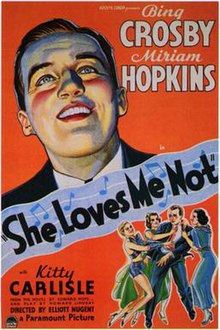She Loves Me Not is a 1934 American comedy film directed by Elliott Nugent and starring Bing Crosby and Miriam Hopkins.[1] Based on the novel She Loves Me Not by Edward Hope and the subsequent play by Howard Lindsay, the film is about a cabaret dancer who witnesses a murder and is forced to hide from gangsters by disguising herself as a male Princeton student. Distributed by Paramount Pictures, the film has been remade twice as True to the Army (1942) and as How to Be Very, Very Popular in (1955), the latter starring Betty Grable. The film is notable for containing one of the first major performances of Bing Crosby, and it helped launch him to future stardom. This was also the last film that Miriam Hopkins made under her contract to Paramount Pictures, which began in the early 1930s upon her arrival in Hollywood. In 1935, the film received an Academy Award nomination for Best Original Song for "Love in Bloom", theme song of comedian Jack Benny.[2]
| She Loves Me Not | |
|---|---|
 Theatrical release poster | |
| Directed by | Elliott Nugent |
| Screenplay by | Benjamin Glazer |
| Based on | She Loves Me Not by
|
| Produced by | Benjamin Glazer |
| Starring | |
| Cinematography | Charles Lang |
| Edited by | Hugh Bennett |
| Music by | Tom Satterfield |
Production company | |
| Distributed by | Paramount Pictures |
Release date |
|
Running time | 85 minutes |
| Country | United States |
| Language | English |
Cast edit
- Bing Crosby as Paul Lawton
- Miriam Hopkins as Curly Flagg
- Kitty Carlisle as Midge Mercer
- Edward J. Nugent as Buzz Jones
- Henry Stephenson as Dean Mercer
- Maude Turner Gordon as Mrs. Arbuthnot [3]
- Warren Hymer as Mugg Schnitzel
- Lynne Overman as Gus McNeal
- Judith Allen as Frances Arbuthnot
- George Barbier as J. Thorval Jones
- Henry Kolker as Charles M. Lawton
- Vince Barnett as Baldy O'Hara
- Margaret Armstrong as Martha
- Ralf Harolde as J. B.
- Matt McHugh as Andy
- Franklyn Cordell as Arkle[4]
Reception edit
The film was one of Paramount's biggest hits of the year.[5]
Mordaunt Hall, writing in The New York Times, liked it saying, "As on the stage, this adaptation is a swift-paced piece of hilarity, with occasional romantic interludes during which Bing Crosby and Kitty Carlisle contribute some tuneful melodies. Some of the farcical episodes in this Paramount offering are apt to recall that famous old comedy, "Charley's Aunt", but in the present production, instead of having a varsity student in skirts, they dress up a cabaret girl in male attire after she has invaded a dormitory room."[6]
Variety had a mixed reaction "...But apart from this possible captiousness Par's ‘She Loves’ holds plenty for the gate. Crosby is most of it. He looks better than ever (somehow his stature has been built up although the faintest suggestion of embonpoint doesn't quite jell with a Princeton undergrad), but he acts intelligently and sings those tunes. The songs will be no small asset to the film. There are three outstanders, two by Revel and Gordon—‘Straight from the Shoulder (Right from the Heart),’ and ‘I’m Hummin’, (I'm Singin’, I'm Whistlin’) and one by Robin and Rainger (‘Love in Bloom’) — and the latter is the smash hit of the flicker and currently Tin Pan Alley's No. 1 song, so it's easy to figure out the b.o. reaction."[7]
Songs edit
- "Love in Bloom" (Leo Robin and Ralph Rainger) – sung by Bing Crosby and Kitty Carlisle
- "After All You're All I'm After" (Edward Heyman and Arthur Schwartz) (written for the film but not used)
- "Straight from the Shoulder" (Mack Gordon and Harry Revel) – sung by Bing Crosby and Kitty Carlisle
- "I'm Hummin', I'm Whistlin', I'm Singin'" (Mack Gordon and Harry Revel) – sung by Bing Crosby.
- "Put a Little Rhythm in Everything You Do" (Mack Gordon and Harry Revel)[8] – sung by Miriam Hopkins.
Crosby recorded some of the songs for Brunswick Records.[9] "Love in Bloom" topped the charts of the day for six weeks.[10]
References edit
- ^ "She Loves Me Not". Internet Movie Database. Retrieved September 1, 2012.
- ^ "Awards for She Loves Me Not". Internet Movie Database. Retrieved September 1, 2012.
- ^ Hall, Mordaunt (September 8, 1934). "Movie Review of She Loves Me Not". The New York Times. Retrieved September 1, 2012.
- ^ Reynolds, Fred (1986). Road to Hollywood. Gateshead, UK: John Joyce. p. 62.
- ^ DOUGLAS W. CHURCHILL.HOLLYWOOD (Dec 30, 1934). "THE YEAR IN HOLLYWOOD: 1934 May Be Remembered as the Beginning of the Sweetness-and-Light Era". New York Times. p. X5.
- ^ The New York Times. September 8, 1934.
{{cite journal}}: Missing or empty|title=(help) - ^ "Variety". Variety. September 11, 1934.
- ^ Burton, Jack. The Blue Book of Hollywood Musicals. Century House, 1953.
- ^ Baker, Richard. "A Bing Crosby Discography". BING magazine. Retrieved March 28, 2016.
- ^ Whitburn, Joel (1986). Pop Memories 1890–1954. Wisconsin, USA: Record Research Inc. p. 105. ISBN 0-89820-083-0.